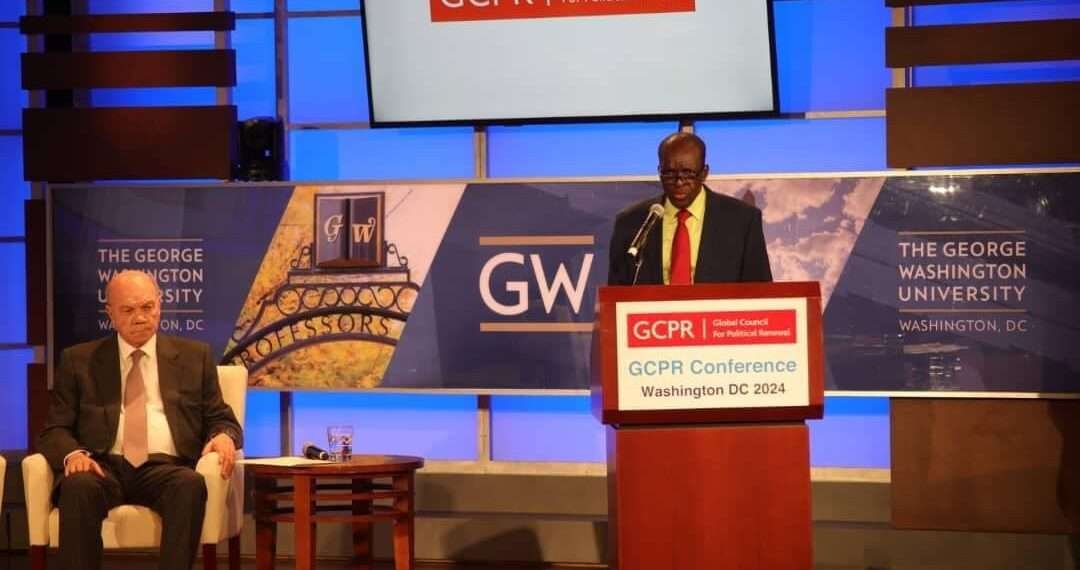In the modern era, where societies are becoming increasingly interconnected and complex, the role of political leaders has evolved to include not just the management of political systems but also the ethical guidance of their communities.
Rt. Hon. Alban Kingsford Sumana Bagbin, Speaker of Parliament has intimated to Political leaders across the globe to guide their conduct with ethical standards.
At the second annual conference of the Global Council for Political Renewal (GCPR) in Washington to support world peace and social justice, Speaker Bagbin noted that corruption, rigging, vote buying, misappropriation of public funds, and the use of intemperate language have become a common feature in the politics of many countries.
“Despite the importance of ethics in politics, conflicts of interest manifest in various forms, including financial interests, personal relationships, and party affiliations, all detract from ethical principles and erode public trust in leaders. These require deliberateness to be mitigated.”
Rt. Hon. Alban Kingsford Sumana Bagbin, Speaker of Parliament
Ethical political leadership is crucial for restoring public trust in political leaders and government, which is essential for the effective functioning of democratic systems.
Ethical leadership practices can help restore some of the lost trust in political leaders, as public evaluation of leaders’ characteristics such as honesty, fairness, and concern for others significantly affects public trust.
The ethical framework for political leaders should include a regulatory framework (code of conduct), being a moral person, and being a moral leader. The regulatory framework establishes how a government and its society function and enforces the behaviors and actions individuals are expected to follow. Ethical leadership comes from within the individual’s moral sense, suggesting what individuals should follow.
According to the Rt. Hon. Speaker, Ghana has formed the Ethics Committee of the Parliament of Ghana which seeks to check the conduct of MPs and officials of the House along ethical lines.
Additionally, trust in political leaders is vital for the effective functioning of a democratic government. Public trust refers to the level of confidence citizens have in their elected representatives to act appropriately and honestly in the public interest rather than from self-interest.
The Committee on Standards in Public Life promotes the seven principles of public life, including selflessness, integrity, objectivity, accountability, openness, honesty, and leadership, to promote and maintain the standards expected by the public.
Commitment to Ethical Leadership
Despite the importance of ethical leadership, public trust in political leaders is declining. This decline is partly caused by unethical leadership behavior. The solution lies mainly in the hands of the politicians themselves.
Political leaders should strive to become moral persons and leaders, setting good examples of behavior, setting the tone at the top, and challenging those who do not behave ethically. This approach can gradually increase public trust in political leaders.
“To embed ethics in political conduct, countries must adopt strict anti-corruption laws, and encourage independent anti-corruption bodies to monitor political conduct. These would deter public officers from unethical conduct. Civil Society Organizations and the media should be supported as watchdogs and advocates.”
Rt. Hon. Alban Kingsford Sumana Bagbin, Speaker of Parliament
Also, accountability mechanisms must be credible, independent, impartial, and transparent. They should have unfettered access to all relevant authorities, persons, places, and information, as well as adequate financial and human resources.
Citizens must ensure that political leaders guide their conduct with ethical standards, by a comprehensive approach that combines internal and external accountability mechanisms, international cooperation, and a commitment to transparency, impartiality, and the protection of victims. By implementing these strategies, societies can foster a culture of accountability that promotes ethical governance and protects the rights and well-being of their citizens.
Ethical political leadership is essential for restoring public trust in political leaders and government. Ethical leaders should not only comply with the codes and rules but also act as moral role models, setting good examples and challenging unethical behavior.
By doing so, they can gradually restore some of the lost trust and ensure the effective functioning of democratic systems. The future of the human race and the effective management of societal challenges depend on the ethical conduct of political leaders.
READ ALSO: Power Scrimmage, “An Executive Overreach”





















